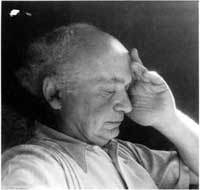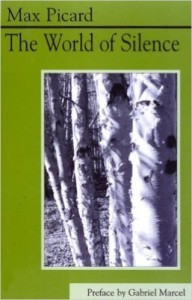In this profoundly illuminating book, first published in 1948, renowned Swiss philosopher Max Picard expresses the nature and meaning of silence in poetic, lyrical, and honest language that helps call forth the silence that lies as the mostly unrecognized source of our own being. Without fanfare, the book “takes us back to the beginning of things.”
 Demonstrating that silence can indeed be spoken about in a way that does not denude it of its power to transform and awaken, Max Picard takes us on a journey into ourselves, covering such topics (all chapter titles) as the nature of silence, the silence in speech, the ego and silence, knowledge and silence, love and silence, time and silence, the noise of words, and many more.
Demonstrating that silence can indeed be spoken about in a way that does not denude it of its power to transform and awaken, Max Picard takes us on a journey into ourselves, covering such topics (all chapter titles) as the nature of silence, the silence in speech, the ego and silence, knowledge and silence, love and silence, time and silence, the noise of words, and many more.
Even a few words from this book can help us understand, in an entirely new way, some of the many problems that face us in today’s noise-filled world, where communication consists mainly of sound bites designed to promote some personal, social, political, or spiritual viewpoint, agenda, or action. So, instead of attempting to “review” this book, I shall let you hear from Picard himself, offering some quotations that have impacted my own life.
“In every moment of time, man through silence can be with the origins of all things.” (p. 22)
“Silence contains everything within itself. It is not waiting for anything; it is always wholly present in itself and it completely fills out the space in which it appears.” (p. 18)
“Where silence is, man is observed by silence. Silence looks at man more than man looks at silence.” (p. 17)
“Not until one man speaks to another, does he learn that speech no longer belongs to silence but to man. He learns it through the Thou of the other person, for through the Thou the word first belongs to man and no longer to silence. When two people are conversing with one another, however, a third is always present: Silence is listening. That is what gives breadth to a conversation: when the words are not moving merely within the narrow space occupied by the two speakers, but come from afar, from the place where silence is listening. That gives the words a new fullness. But not only that: the words are spoken as it were from the silence, from that third person, and the listener receives more than the speaker alone is able to give. Silence is the third speaker in such a conversation. At the end of the Platonic dialogues it is always as though silence itself were speaking. The persons who were speaking seem to have become listeners to silence.” (p. 25)
“Today words no longer arise out of silence, through a creative act of the spirit which gives meaning to language and to the silence, but from other words, from the noise of other words. Neither do they return to the silence but into the noise of other words, to become immersed therein.” (p. 168)
“When the substance of silence is present in a man, all his qualities are centered in it; they are all connected primarily with the silence and only secondarily with each other. Therefore it is not so easy for the defect of one quality to infect all the others, since it is kept in its place by the silence. But if there is no silence, a man can be totally infected by a single defect so that he ceases to be a man …” (p. 70)
“There is an immeasurability in happiness that only feels at home in the breadth of silence. Happiness and silence belong together just as do profit and noise.” (p. 71)
For those interested in awakening to the miracle of their own wholeness, The World of Silence is a book that, once opened, will be a lifetime companion. Just a few minutes of reading in the middle of your busy day can help you rediscover “the substance of silence” in your own words and actions–or at least show you how out of touch with silence your words and actions actually are.
All quotations From Max Picard, The World of Silence, Gateway Editions (Washington D.C., 1988).
